Rob Bell's Blog, page 35
October 10, 2013
3 rules for playing consistent
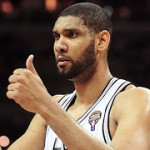 Mental Toughness is not always about playing your best. It is often more about playing consistent, because it matters how bad are the bad days. Most coaches will tell you that they thirst for the consistent performer over the streaky athlete. So, if you are not achieving consistent results, here are three aspects to examine.
Mental Toughness is not always about playing your best. It is often more about playing consistent, because it matters how bad are the bad days. Most coaches will tell you that they thirst for the consistent performer over the streaky athlete. So, if you are not achieving consistent results, here are three aspects to examine.
1) You are not hustling:
Nothing can replace hustle. Look at the very best in your sport at the highest level and I guarantee that they put forth the most preparation. It is the first step toward building consistency because we must know that we have put forth in the effort necessary. Ghandi once stated “the harder we work, the tougher it is to surrender.” A rule to follow is to look at who works the hardest on your team and outwork them.
2) You are not preparing the right way:
It pains me when I see the hardest workers not seeing results. Often enough though, it is because they are not addressing the correct things. Remember, we play like we train! In order to play consistent, we simply must compete and create pressure in practice.
3) You are putting too much pressure on yourself:
Trying harder rarely works in competition and when we feel like we are not getting anything out of our game, we are often “getting in our own way.” Focusing on results as opposed to the execution can cause us to play careful, tight, and trying NOT to mess up. Pressure stems from a variety of places (expectations mostly) and it slowly creeps into our mentality and game. Thus, we must completely devote ourselves to the task at hand and staying aggressive. Peyton Manning summed it up perfectly, “Pressure is something you feel when you don’t know what the hell you’re doing.”

 Dr. Rob Bell is a Sport Psychology coach based in Indianapolis. DRB & Associates works with athletes, coaches, and teams building their Mental Toughness. His 2nd book titled The Hinge: The Importance of Mental Toughness will be released soon. Twitter: @drrobbell
Dr. Rob Bell is a Sport Psychology coach based in Indianapolis. DRB & Associates works with athletes, coaches, and teams building their Mental Toughness. His 2nd book titled The Hinge: The Importance of Mental Toughness will be released soon. Twitter: @drrobbell
October 7, 2013
How the iPhone can ruin your golf game
 The iPhone has this one annoying feature when we text called auto-correct. Haven’t we all sent text messages that auto-corrects one word and the entire message becomes whacked? Okay, even sometimes amusingly. We then have to quickly follow-up with another text. We knew what we wanted to say, but auto-correct had other ideas.
The iPhone has this one annoying feature when we text called auto-correct. Haven’t we all sent text messages that auto-corrects one word and the entire message becomes whacked? Okay, even sometimes amusingly. We then have to quickly follow-up with another text. We knew what we wanted to say, but auto-correct had other ideas.
Our golf game has an auto-correct feature. We line up for a 6-foot putt. After reading the line and knowing that it is a right edge putt, we stand over the ball and are ready to stroke the putt. Except at the very last second we turn into an iPhone.
We become an iPhone because we autocorrect our own play. Even though we were ready to commit to the right edge of the putt, at the very last second, we autocorrect, and pick a different line.
Now autocorrect is sometimes effective on our phone, but it is rarely, if ever, effective when we play. Almost always, the putt isn’t going in if we didn’t commit 100%. But a worse thing actually results from auto-correct. We become upset because we missed the putt, but more upset because we didn’t trust our line or ourselves.
Remove the auto-correct feature in your play.
If you or your team is looking for Mental Toughness. Contact us here…

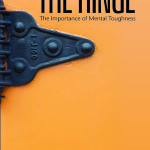 Dr. Rob Bell is a Sport Psychology coach based in Indianapolis. DRB & Associates works with athletes, coaches, and teams building their Mental Toughness. His 2nd book titled The Hinge: The Importance of Mental Toughness will be released soon. Twitter: @drrobbell
Dr. Rob Bell is a Sport Psychology coach based in Indianapolis. DRB & Associates works with athletes, coaches, and teams building their Mental Toughness. His 2nd book titled The Hinge: The Importance of Mental Toughness will be released soon. Twitter: @drrobbell
September 27, 2013
3 characteristics of the best athletes…
People often ask, what are the features of the very best athletes? Having coached, observed, studied, collaborated, spent time and spoken with athletes for my entire life, here are the three (3) characteristics. Note: I have chosen not to include talent, because talent is a pre-requisite.
jeanette cash coldwell banker advantage
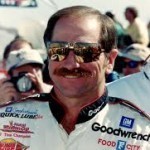 1) Passion- The best possess an unquenchable thirst to see how good that they can become & they LOVE their sport. This passion translates into a willingness and desire for hard work. Dale Earnhardt was once in an accident and could not finish his next race at Indianapolis Motor Speedway. He started the race, but they had to remove him from the car. Here was the greatest racecar driver, basically crying, because they had to take him out of the car. He said, “ Nobody loves anything more than my driving a racecar.”
1) Passion- The best possess an unquenchable thirst to see how good that they can become & they LOVE their sport. This passion translates into a willingness and desire for hard work. Dale Earnhardt was once in an accident and could not finish his next race at Indianapolis Motor Speedway. He started the race, but they had to remove him from the car. Here was the greatest racecar driver, basically crying, because they had to take him out of the car. He said, “ Nobody loves anything more than my driving a racecar.”
2) Competitiveness- The best athletes love to compete and put themselves in situations that test their skills. The competitiveness is more than just beating others; it is the feeling that they get from testing themselves under pressure. I often witness athletes even outside of their own sport, remain so competitive to win regardless of the event (e.g., checkers, sit-ups, darts, pogo-stick, etc.). They may fear losing, but they don’t succumb to that fear, they have an inner confidence that they continually compete. As Jimmy Connors once stated, “I hate to lose, more than I love to win.”
3) Another Gear- If you listen to quality sports announcers close enough, they mention how certain players can change speeds. For example, Emmitt Smith holds the record for career rushing yardage in the NFL, and while few state that he is the best ball carrier of all time, he was nonetheless able to hit the gap successfully and turn downfield—He had another gear. The best are able to muster up the inner fortitude and the “it” factor which allows them to finish strong. They simply have another gear…
These skills may be more innate with the best, but they can be learned and cultivated. Honestly assess your own mental game and answer which of these characteristics do you possess and which one’s need strengthened.

 Dr. Rob Bell is a Sport Psychology coach based in Indianapolis. DRB & Associates works with athletes, coaches, and teams building their Mental Toughness. His 2nd book titled The Hinge: The Importance of Mental Toughness will be released soon. Twitter: @drrobbell
Dr. Rob Bell is a Sport Psychology coach based in Indianapolis. DRB & Associates works with athletes, coaches, and teams building their Mental Toughness. His 2nd book titled The Hinge: The Importance of Mental Toughness will be released soon. Twitter: @drrobbell
September 19, 2013
Why injured athletes need to return at 100% (i.e., RG3)
It is a shame that Robert Griffin III is not even close to the same quarterback he was last season. His Rookie of the Year season produced not only 27 TDs, over 800 rushing yards, and a playoff berth, but he also provided the franchise hope. The Washington Redskins finally had a quarterback that was “better” than advertised.
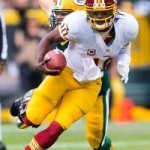
Jeff Hanisch/USA TODAY Sports
And now it’s all changed…that’s what injuries do.
Less then 10 months after tearing his knee, RG3 is playing hurt, and its obvious that he is not 100%. His ability to scramble and provide the same read-option offense as last season is simply non-existent. Even his throwing mechanics are adjusted due to his knee. Now, those issues will be remedied with time, however unfortunately the worse is probably yet to come.
What happens mentally with athletes when they get injured is that they return too soon. In the athletes mind, they feel close to the same as before the injury, however after returning too fast, they soon discover that they are off. They may feel fine for 9 out of 10 plays, but that one play where they can’t cut, accelerate, or move like before causes doubt. Physically, it causes them to muscle guard and protect the injured area.
Doubt, which has never been there before is suddenly present. Doubt causes slight hesitations, over-thinking, or even trying to do too much. As a result of the doubt and less than stellar play, they lose confidence! In the RG3 situation, add the microscope of being an NFL quarterback, the highest of expectations for the team, the questionable coaching/doctor relationship, the media scrutiny, and one can magnify the pressure to perform ten-fold.
An athlete’s greatest strength is their confidence; it is why they are so great. If an athlete is allowed to return too fast and is not 100%, the confidence slowly goes and it is often difficult to get it back.

Photo:Reuters
Compare this scenario of RG3 with another phenomenon with a knee injury, Derrick Rose. He sat out the entire 2012- 2013 season with the Chicago Bulls and came under intense scrutiny from everyone. However, he knew he wasn’t 100% and only now two weeks before NBA training camp, and 17 months later does he announce that he finally is healthy.
It’s not courageous to return when you’re injured. Advice to all athletes, injuries are one of the toughest things you’ll experience, but you must return to play ONLY when you are 100%.
 Dr. Rob Bell is a Sport Psychology coach based in Indianapolis. DRB & Associates works with athletes, coaches, and teams building their Mental Toughness. His 2nd book titled The Hinge: The Importance of Mental Toughness will be released soon. Twitter: @drrobbell
Dr. Rob Bell is a Sport Psychology coach based in Indianapolis. DRB & Associates works with athletes, coaches, and teams building their Mental Toughness. His 2nd book titled The Hinge: The Importance of Mental Toughness will be released soon. Twitter: @drrobbell
September 6, 2013
Play this game and see if you’re a control freak.
Have you ever played the game— I love you more? Choose from the following three choices, which relationship best describes you. 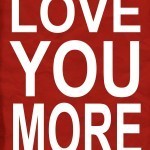
1) Your partner loves you more than you love him or her.
Or
2) You love your partner more then he/she loves you.
Or
3) You love each other equally, but it is really boring.
Now, if you did not pick an answer that says something about you as well. But, the question, if answered honestly, reveals so much about our sense of control.
If we picked answer #1, we want to be loved more than our loving the other person. It means we value and cherish being in control. We actually fear losing control even to the person we are most intimate with physically, emotionally, and spiritually.
If we picked answer #2, we sacrifice control over the relationship, knowing what ultimate love really feels like. It involves 100% complete trust and surrender, because we believe that our emotional needs will still be met. It means that we are willing to be vulnerable and completely exposed. If your heart has ever been broken and you can honestly pick #2, you’re stronger than you think.
If answer #3 was your choice, you either weren’t honest or you really are boring. There is nothing wrong with this choice either, except that you struggle with choices.
I work with athletes and coaches who are natural control freaks… There is nothing wrong with choosing #1. I don’t celebrate that I picked #1, but it also means that when we lose perceived control, we can get stressed or un-productive.
Bottom-line: we confuse and spend too much time on the things we can influence, namely other people, rather then focusing only on the things within our control; our attitude, preparation, and our hustle. If you’re stressed, it usually is a result of focusing on others and expectations of others rather than on the things we can control.
 Dr. Rob Bell is a Sport Psychology coach based in Indianapolis. DRB works with athletes, coaches, and teams building their Mental Toughness. His 2nd book titled The Hinge: The Importance of Mental Toughness will be released soon. Twitter: @drrobbell
Dr. Rob Bell is a Sport Psychology coach based in Indianapolis. DRB works with athletes, coaches, and teams building their Mental Toughness. His 2nd book titled The Hinge: The Importance of Mental Toughness will be released soon. Twitter: @drrobbell
August 29, 2013
How I got Adam Vinatieri to contribute to my book.
Any successful NFL kicker is the epitome of mental toughness, and Adam Vinatieri is the most clutch kicker of all-time. This is evident in his record four Super bowl victories; three of those as a result of his game winning kicks.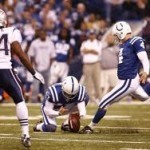
My intention from the beginning of the book was to interview Adam Vinatieri about his mental toughness, but also about his Hinge moment. The Hinge is that one moment, event, or person that connects who we are with who we become.
One of Adam Vinatieri’s Hinge moments occurred while he was a freshman at West Point. Now, I can’t go in depth here, that’s what the book is for, but the mental toughness he displayed during his time at West Point transferred into his kicking and wanting the game on the line.
Okay, so how did I get the interview? For starters, after re-reading Think and Grow Rich, I set my intention to interview him. When any of us set our intention on a target, we find a way to achieve that goal. It’s that simple. It’s never easy, but it is simple.
So, I contacted everyone I knew who might have access to him. I wrote several letters telling him about the book and its premise. I even showed up at the Colts camp. Every single function I was at, I even brought up the topic and inquired if he or she might have an “in.” No luck.
Until, my Hinge came along. The premise of the Hinge includes that one person who makes the difference in our lives. We may know hundreds of people, but it will result in just that one person, who gives us a break, or an opportunity, or introduces us to that right person.
Phil Richards, the awesome columnist of the Indianapolis Star was that Hinge. He made the connection and while at the Outer Banks on vacation with my family, Adam Vinatieri called me up.
Let me be honest, I hope this isn’t the end of the story, because I am still seeking a testimonial from Adam Vinatieri for the back cover of the book. He hasn’t (yet). A lot of it is out of my control now; if it is meant to be, it will happen. In the least, he provided an awesome story in The Hinge: The Importance of Mental Toughness.
 Dr. Rob Bell is a Sport Psychology coach based in Indianapolis. DRB works with athletes, coaches, and teams building their Mental Toughness. His 2nd book titled The Hinge: The Importance of Mental Toughness will be released soon. Twitter: @drrobbell
Dr. Rob Bell is a Sport Psychology coach based in Indianapolis. DRB works with athletes, coaches, and teams building their Mental Toughness. His 2nd book titled The Hinge: The Importance of Mental Toughness will be released soon. Twitter: @drrobbell
August 16, 2013
How an unseeded player won the USTA Nationals
Collin Altamirano won the 2013 USTA Nationals—the most competitive junior tournament in the United States and an invite into the coveted U.S. Open. In doing so, he became the first unseeded player ever to win the event.
One of Collin’s strengths evident at the USTA Nationals was his ability to hit the best ball. His years of training and thousands of hits were evident. At every match, he moved opponents back, grinded out points, and took advantage of short balls by hitting clean winners.
They don’t give these championships away…
Collin, his family, and his coach Joe Gilbert, owner of JMG Tennis Academy have all had years of sacrifice and dedication to achieve this prestigious victory. While his family lived hours away in Santa Barbara, he trained with his coach in Sacramento living under his roof and his tutelage.
The environment created was one of discipline and hard work. You can imagine there have been many pats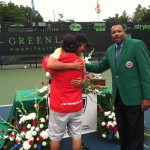 on the back as well as some kicks in the ass. Coach Gilbert stated, “I put a child that was not my own as a top priority in my life. We gained a relationship that was worth all the sacrifice. No matter where this journey ends we will always look back on the hardest times as the times we learned the most.”
on the back as well as some kicks in the ass. Coach Gilbert stated, “I put a child that was not my own as a top priority in my life. We gained a relationship that was worth all the sacrifice. No matter where this journey ends we will always look back on the hardest times as the times we learned the most.”
Altamirano’s schedule also prepared him for Nationals. His training included a mix of ATP challenger events, USTA Junior events, & ITF pro circuit draws. Having qualified for 6 professional main draws during the season, these various types of matches and play brought forth both difficulty and success. He played many different opponents and improved at encountering several styles of play. In that, he learned more about himself and his game at each tournament along the way. In fact, he won a local pro event immediately before coming to the USTA Nationals, which help cement his belief in his game.
The Hinge…
Due to his unseeded draw, he encountered two top players in the opening rounds. In both of these matches, Collin faced adversity and actually dropped the first set both times. In fact, during his second round match against the 16th seed, Deiton Baughman, he had never beaten him until that day. However, he competed, made the adjustments, battled back and found a way to win. Collin showed his grit and confidence early on in the tournament and it carried over to each match, not losing another set the rest of the tournament.
In every match, and every tournament, there are hinge moments…The one point, game, or match that makes all the difference. Since none of us know when these moments will come, our role is to be mentally tough. Being able to bounce back and win early on provided Collin the confidence moving forward in the tournament and beyond.
 About The Author: Dr. Rob Bell is a Sport psychology coach based in Indianapolis. He works with athletes, coaches, and teams helping them play their best when it matters the most. His 2nd Book will be out late September. The Hinge: The Importance of Mental Toughness.
About The Author: Dr. Rob Bell is a Sport psychology coach based in Indianapolis. He works with athletes, coaches, and teams helping them play their best when it matters the most. His 2nd Book will be out late September. The Hinge: The Importance of Mental Toughness.
August 8, 2013
The Hinge Quarterback
(Excerpt from The Hinge: The Importance of Mental Toughness)
This quarterback threw more career interceptions (220) than touchdowns (173). He completed only 50.1% of his passes and his career QB rating was 65.5. (Mark Sanchez would be the hands down starter compared to these numbers). This quarterback also lost more games in his career than he won—68-71-4. This quarterback was also inducted into the Hall of Fame in 1985 because it only takes one.
The Hinge…
There were two leagues during the late 1960s, the National Football League (NFL) and the American Football League (AFL). The winner of each conference played in the “Super Bowl.” The NFL, however, was vastly superior to the AFL.
In 1969, quarterback Joe Namath and his AFL team, the New York Jets, were 19-point underdogs going into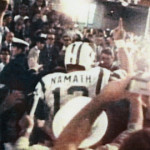 Super Bowl III against the NFL team, the Baltimore Colts; 19 points!
Super Bowl III against the NFL team, the Baltimore Colts; 19 points!
On Thursday night before the game, at the press conference, Joe Namath stated, “We’re gonna win the game, I guarantee it.”20
He orchestrated the iconic victory, winning 16-7 and despite not even throwing a touchdown pass, was awarded the Super Bowl III MVP. The win by the Jets and the guarantee by Namath solidified his career and the NFL. The next season, the two leagues merged.
It only takes one… Our ability to believe, have confidence, and to trust is the most important mental skill we possess.
Dr. Bell is a Sport Psychology coach who works with athletes, coaches, and teams. His 2nd book is on pre-release and will be out in September. The Hinge: The Importance of Mental Toughness Twitter: @drrobbell
August 2, 2013
How a Reader’s Digest became my Hinge…
The Hinge connects who we are with who we become. It is the one moment, event, or person that makes the difference in our lives…
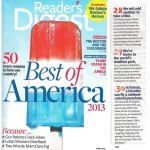 As a teenager, my grandmother used to give me the awesome gift of, wait for it, Reader’s Digest…As a fifteen year-old, Reader’s Digest really didn’t fit my needs. However, it did become great bathroom material and I would read it while on the porcelain throne. Well, within Reader’s Digest, I once read a story about the “runner’s high,” the physiological and psychological effect that runners would sometimes encounter during long runs. It was like “being in the zone.” The study looked at how the personalities of those running long distances may transfer into other areas of their lives…. Fast-forward eight years to the end of college; I had to choose a research project in my advanced Psychology class to graduate. I immediately remembered the Runner’s High story in Reader’s Digest and replicated the same study, with no further thought.
As a teenager, my grandmother used to give me the awesome gift of, wait for it, Reader’s Digest…As a fifteen year-old, Reader’s Digest really didn’t fit my needs. However, it did become great bathroom material and I would read it while on the porcelain throne. Well, within Reader’s Digest, I once read a story about the “runner’s high,” the physiological and psychological effect that runners would sometimes encounter during long runs. It was like “being in the zone.” The study looked at how the personalities of those running long distances may transfer into other areas of their lives…. Fast-forward eight years to the end of college; I had to choose a research project in my advanced Psychology class to graduate. I immediately remembered the Runner’s High story in Reader’s Digest and replicated the same study, with no further thought.
I knew early on that Sport Psychology would become my chosen path in life, so I applied to Temple University’s graduate school, although I never really applied myself in undergrad until my junior year, I was a hinge candidate at best.
The in-person interview went surprisingly well and, in fact, the Temple University professor repeatedly probed at length my little research project on the Runner’s High. I was actually accepted and even received a graduate assistantship that paid for school. Turns out, my professor, Dr. Michael Sachs, was the one who coined the phrase, Runner’s High…
The Hinge….
If it weren’t for my grandmother supplying me with Reader’s Digest subscriptions as a teenager, I would not have been accepted into Temple University’s graduate program, nor met my wife, nor continued on to Graduate work at The University of Tennessee, nor caddied on the PGA Tour, or work with so many gifted athletes. My story and this story would have been different. Things happened in my life for a reason.
Who or what have been hinges in your life? Share your Hinge moment here.
 Author: Dr. Rob Bell is a Sport Psychology Coach and the author of his 2nd book- The Hinge: The Importance of Mental Toughness It is on pre-order and will be out in September.
Author: Dr. Rob Bell is a Sport Psychology Coach and the author of his 2nd book- The Hinge: The Importance of Mental Toughness It is on pre-order and will be out in September.



